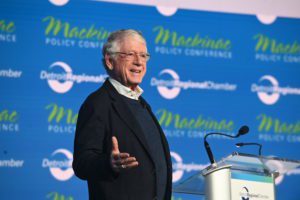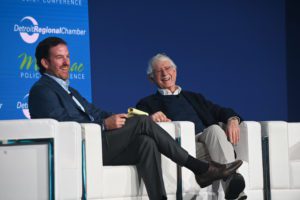Ted Koppel: Thoughts on mass media’s evolution — and on prepping for likely power grid cyberattack
June 1, 2022By Crain’s Content Studio
Key Takeaways
- A cyberattack on the nation’s power grid is a real possibility in the wake of the Russian war.
- In researching a book six years ago, journalist Ted Koppel found that the country was ill-prepared to respond in the event of a widespread power grid outage.
- Because trust — in mass media, political parties, and one another — has deteriorated over the years, partly because “the internet has made everyone a publisher,” even major nonpartisan events have become partisan.
 Michigan business leaders need to invest in protection against a likely cyberattack on the electric grid — and Michigan policy leaders need to commit to working across party lines if and when such a disaster happens.
Michigan business leaders need to invest in protection against a likely cyberattack on the electric grid — and Michigan policy leaders need to commit to working across party lines if and when such a disaster happens.
That was the delicate advice and somber warning of legendary news anchor Ted Koppel, who delivered the first keynote address of the Mackinac Policy Conference on Wednesday, June 1. Koppel, who wrote about the nation’s unpreparedness in the event of a power-grid cyberattack in the 2016 book “Lights Out,” pointed to the U.S. involvement in the Russia-Ukraine conflict as a potential target for Russian cyber attackers.
“Michigan businesses need to be aware,” Koppel said. “If we are without electricity, I don’t have to tell you what the impact of that is going to be. I began calling different federal agencies and came to the conclusion that there has been no plan made for the impact (such an attack would have) on our power grid.”
Koppel began his keynote with an a cappella rendition of “It’s Hard to be Humble” and ended with a song he said he wrote while traveling with President Nixon to the Great Wall of China 50 years ago.
After his remarks, Koppel was joined on stage by KC Crain, President and Chief Executive Officer of Crain Communications and Publisher of Crain’s Detroit Business. Crain asked Koppel to recall a turning point in his storied career.
 “I was working at a radio station in New York City, and I heard that ABC Radio was auditioning people,” Koppel said. “I wrote a script, and I went and took the audition. They called me back and said, ‘You did really well,’ but I was 23 at the time, and they said, ‘We can’t hire a 23-year-old as an ABC correspondent.
“I was working at a radio station in New York City, and I heard that ABC Radio was auditioning people,” Koppel said. “I wrote a script, and I went and took the audition. They called me back and said, ‘You did really well,’ but I was 23 at the time, and they said, ‘We can’t hire a 23-year-old as an ABC correspondent.
“I had a lot of gall – more gall than brains – because I said, ‘I don’t understand what your problem is, you said I sound good, and you like my writing: this is radio, and no one is going to know how old I am.’”
In 1963, Koppel became the youngest correspondent ever hired by ABC Radio News.
Crain also asked Koppel to share his thoughts on the internet and its place in the greater mass media.
Koppel said the business success of cable news and the business success of radio talk show hosts that lean to one side of the political aisle or another “have taken an America that was largely united every night in front of the flickering altar of the 6:30 news” and divided it.
“The right doesn’t trust the left, and the left doesn’t trust the right, and all of you are skeptical about what you see on television,” he said. “I fear that when we have a natural disaster of some proportion, that we’re all running around saying ‘What do we do, how do we deal with this fiasco’ and then you are going to wish you could turn to reliable, trustworthy people” like the news anchors were in a time before the internet.”
